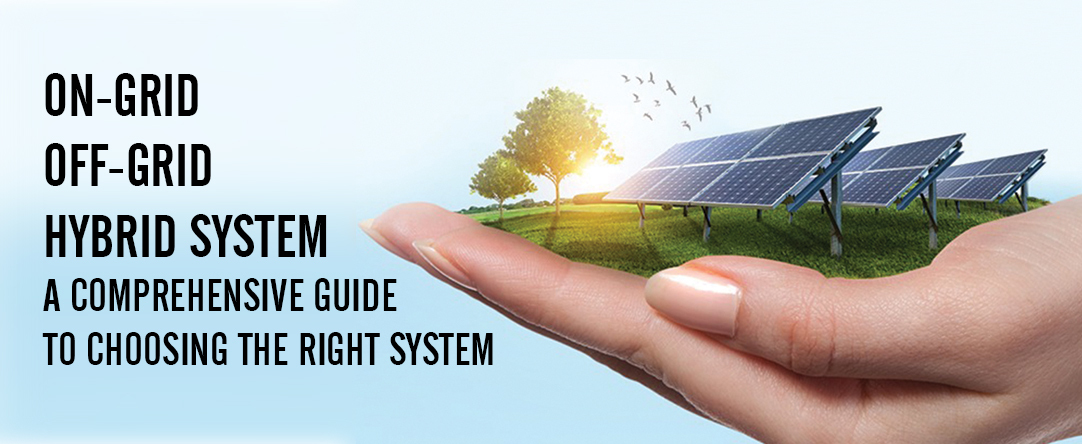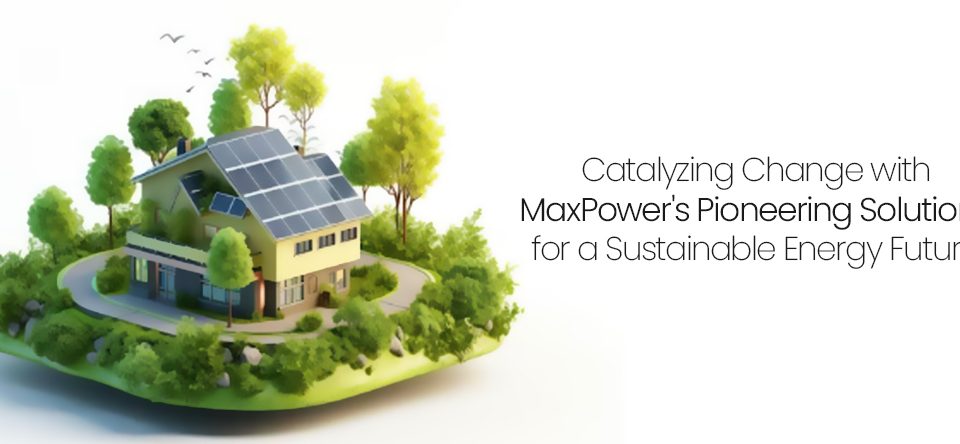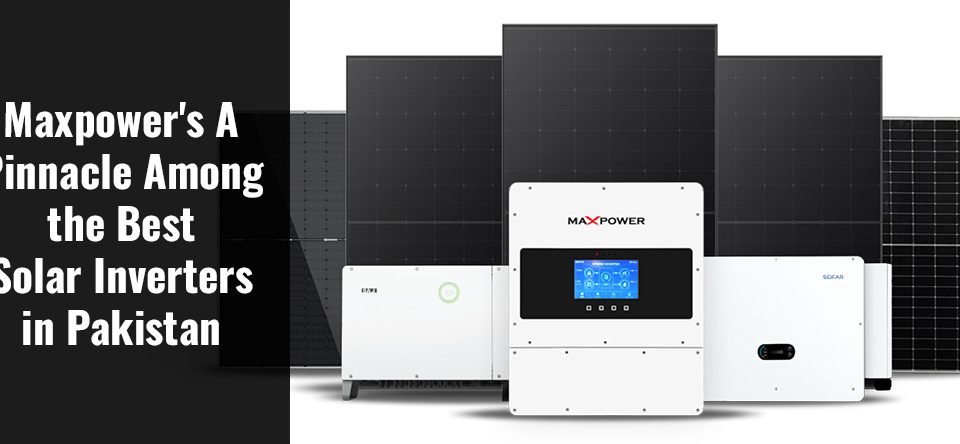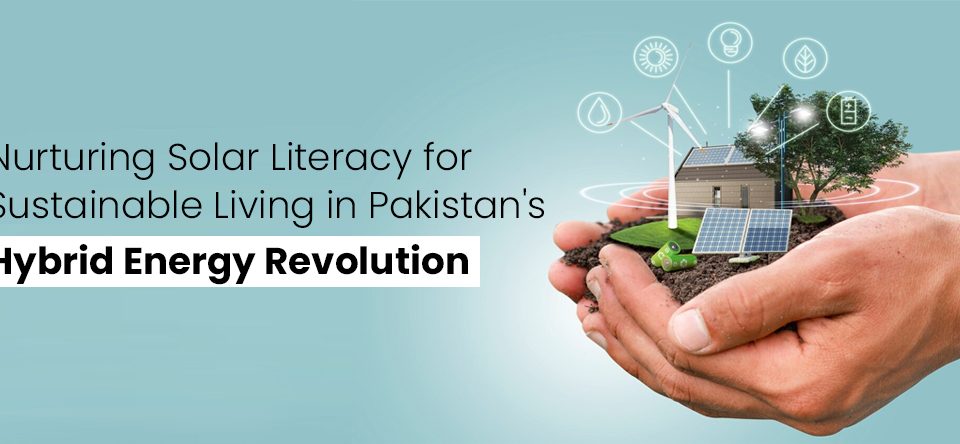
Overcoming Net Metering Challenges: Solutions for a Smoother Transition
June 17, 2023
Harnessing the Best of Both Worlds: Exploring Hybrid Solar Systems
June 23, 2023On-Grid, Off-Grid, and Hybrid Solar System: A Comprehensive Guide to Choosing the Right System
As society continues its push towards environmentally conscious living solutions its’ no surprise that many consumers are investigating using renewable energy sources like solar panels in their homes or businesses. There are three main types of consumer grade solar panel systems currently available: on grid (grid tied). Off grid. And hybrid technology – each with distinct characteristics suited for different needs.
On-Grid Solar System
On grid panels’ link up directly with existing utility grids without needing additional storage units for excess energy produced during peak hours of sunlight production. Instead of storing this surplus energy within batteries on grid panels allow consumers to feed any unused power back into the larger utility network. In times of low or no production on grid systems can also draw electricity from the grid.
Benefits and Advantages
Cost-Effective: Since on-grid systems do not need batteries for storage, they are cheaper to install and maintain. They also allow you to sell surplus energy back to the grid, offsetting energy costs and potentially creating a return on investment.
Reliability: On-grid systems have the added reliability of the local electrical grid, meaning that you can draw power from the grid if your solar panels don’t produce enough electricity for your needs.
Drawbacks and Disadvantages
Dependence on the Grid: If there’s a power outage, on-grid systems cannot provide electricity, as these systems are required to shut down for safety reasons. This can be a significant disadvantage for those in areas prone to power outages.
No Energy Storage: Since these systems do not include energy storage, they cannot store power at night or on cloudy days.
Off-Grid Solar System
As the name suggests, off-grid solar systems operate independently from the local electrical grid. These systems rely on batteries to store the electricity generated by the solar panels, allowing for power usage even when the sun isn’t shining.
Benefits and Advantages
Energy Independence: Off-grid systems can be self-sufficient, providing power even during outages in the main grid. This can be particularly advantageous in remote or rural areas where grid access may be unreliable or unavailable.
Environmental Impact: Off-grid systems provide a clean, renewable energy source that reduces reliance on fossil fuels and decreases carbon footprints.
Drawbacks and Disadvantages
High Initial Cost: Off-grid systems can be expensive to install due to the need for batteries, a charge controller, and sometimes a backup generator. Furthermore, batteries have a limited lifespan and must be replaced periodically.
Energy Limitations: If the system’s battery storage is depleted and there’s no sun, you can run out of power. Similarly, the system might not produce enough power during prolonged periods of cloudy or rainy weather.
Hybrid Solar System
Hybrid systems combine elements of on-grid and off-grid systems. They are connected to the local electrical grid but also feature battery storage.
Benefits and Advantages
Versatility: Hybrid systems offer the best of both worlds. They can feed excess power back into the grid, draw power when needed, and store energy during power outages.
Efficiency: They use advanced inverters and battery charge controllers, allowing greater efficiency and flexibility in power generation and usage.
Drawbacks and Disadvantages
Cost: Hybrid systems are typically more expensive than on-grid systems due to the additional cost of battery storage. However, they can be a good investment in areas prone to power outages or applications where uninterrupted power is critical.
Maintenance: Including batteries means that these systems will require more maintenance than an on-grid system.
Understanding Your Energy Needs
Before you choose a solar system, you need to understand your energy needs. The best way to do this is to examine your electricity bills over the past year and calculate your average monthly energy usage. This will give you an idea of how much electricity your solar system needs to produce.
Consider the patterns in your energy usage. Are there certain months when you use more power? Do you expect your energy needs to increase in the future due to adding an electric vehicle or a home extension? All these factors will influence the type and size of the solar system you should install.
Incentives and Regulations
Financial incentives can significantly reduce the cost of solar systems. Governments often provide tax credits, rebates, or grants for solar installations to encourage the use of renewable energy. Furthermore, some utilities offer net metering, where you’re credited for the excess electricity that your on-grid or hybrid system feeds back into the grid.
However, regulations may also limit your choices. Some jurisdictions have restrictions on installing off-grid systems or specific requirements for systems tied to the grid. Before deciding, research the incentives and regulations applicable to your area or consult with a solar power professional.
Maintaining Your Solar System
Regardless of the type of solar system you choose, proper maintenance will ensure it operates efficiently and lasts as long as possible. This includes regular cleaning of the solar panels to remove dust or debris that can reduce their output. You should also monitor the system’s power production to detect potential issues.
For off-grid and hybrid systems, battery maintenance is crucial. This includes checking the state of charge, topping up fluid levels for certain types of batteries, and ensuring the battery operates within suitable temperature ranges. Some systems may require professional servicing, so consider these ongoing costs when choosing a solar system.
Wrapping it up
Choosing the right solar system is a significant decision that requires careful consideration of your energy needs, budget, local incentives, and regulations. Each system type—on-grid, off-grid, and hybrid—has advantages and disadvantages; the best choice depends on your specific circumstances. By understanding these systems and considering the additional factors discussed in this guide, you will be better equipped to decide on your renewable energy needs. Remember, investing in solar power is a step towards energy independence and a contribution to a more sustainable world.




